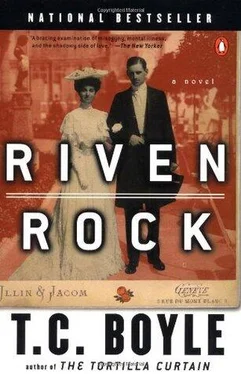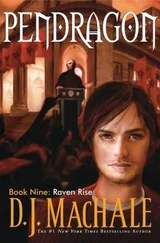T. Boyle - Riven Rock
Здесь есть возможность читать онлайн «T. Boyle - Riven Rock» весь текст электронной книги совершенно бесплатно (целиком полную версию без сокращений). В некоторых случаях можно слушать аудио, скачать через торрент в формате fb2 и присутствует краткое содержание. Год выпуска: 1999, Издательство: Penguin Books, Жанр: Современная проза, на английском языке. Описание произведения, (предисловие) а так же отзывы посетителей доступны на портале библиотеки ЛибКат.
- Название:Riven Rock
- Автор:
- Издательство:Penguin Books
- Жанр:
- Год:1999
- ISBN:нет данных
- Рейтинг книги:5 / 5. Голосов: 1
-
Избранное:Добавить в избранное
- Отзывы:
-
Ваша оценка:
- 100
- 1
- 2
- 3
- 4
- 5
Riven Rock: краткое содержание, описание и аннотация
Предлагаем к чтению аннотацию, описание, краткое содержание или предисловие (зависит от того, что написал сам автор книги «Riven Rock»). Если вы не нашли необходимую информацию о книге — напишите в комментариях, мы постараемся отыскать её.
Riven Rock — читать онлайн бесплатно полную книгу (весь текст) целиком
Ниже представлен текст книги, разбитый по страницам. Система сохранения места последней прочитанной страницы, позволяет с удобством читать онлайн бесплатно книгу «Riven Rock», без необходимости каждый раз заново искать на чём Вы остановились. Поставьте закладку, и сможете в любой момент перейти на страницу, на которой закончили чтение.
Интервал:
Закладка:
As for social life, Stanley was limited to two friends from Princeton — one of whom lived in New York and made infrequent trips to the Midwest — and the companions his mother chose for him from among the duller and more complacent scions of Chicago’s most rigorous and devout mercantile families. After a few failed experiments, she decided against including young ladies in her dinner and card parties, concluding that Stanley, whose health was still delicate, wasn’t at all ready for the emotional strains of courtship and marriage, just as she herself wasn’t ready to give him up, not yet anyway. Certainly he would be married one day, that was an absolute, but he was too young yet, too shy, too much in need of his mother’s guidance.
In the spring of his second year at home, when the Parisian debacle had begun to fade from his memory (though the face of Mireille Sancerre would flower in his mind at the most inconvenient times, as when he was taking his final exam in Contracts or ordering half a dozen shirts from the wilting young brunette at Twombley’s), he agreed to accompany his mother to Santa Barbara, to see to the arrangements for Mary Virginia’s house there. The spring semester had just ended, and with his brother’s collusion he was able to take a six-week leave from the Reaper Works. It was decided that somebody had to see mother through the ordeal of getting Mary Virginia settled once and for all, and since Anita had her young son to look after, and Cyrus Jr. and Harold were both too wrapped up in the business to take off just then (a very difficult time, what with the cutthroat competition from Deering, Warder, Bushnell and Glessner and a battle raging over entry into the markets in India and French Indochina), Stanley was elected.
He didn’t mind. Not at all. Though he took pains to conceal it, he wasn’t really feeling himself — hadn’t been for some time. It was his nerves, that and a certain intensification of his little compulsive habits, like washing his hands over and over till the skin was raw, or adding a column of figures fifteen or twenty times because each time he was afraid he’d made a mistake and each time confirmed that he hadn’t but might have if he weren’t so vigilant, or avoiding the letter R in his files because it was an evil letter, one that growled in his ears with unintelligible accusations and fierce trilling criticisms. He’d been working too hard. Putting too much pressure on himself to perform at the top of his law school class and do the sort of job his mother expected of him at the Reaper Works. Let Cyrus and Harold stay behind — he was glad of the change. So glad he found himself whistling as he packed his bags, the very ones he’d brought back from France, and though he did get a bit bogged down over the question of what to bring and what to leave behind — he drew up long tapering lists on scraps of paper, bits of cardboard, anything that came to hand, and then promptly lost them — he did finally manage to get everything he needed into three steamer trunks and an array of suitcases and handbags so overstuffed they nearly prostrated a team of porters at the station. And on the morning they left, the sun so brilliant everything seemed lit from within, he felt like a subterranean released from the deepest pit.
The first day out, he did nothing but sit at the window with an unopened book in his lap. The country soothed his eyes and he watched the Chicago sun draw away west into Missouri and go to war with the clouds. He slept well and ate well (his mother had brought along a skeleton crew of servants, including the Norwegian cook), and by the third day he was so relaxed he began to feel restive. That was when Nettie suggested he take a look at the plans for Mary Virginia’s house, to see what he thought, because she was wondering herself about the music room, whether it should be in the east or west wing, depending on the sunlight and Mary Virginia’s inclination to play piano in the morning or evening, and if it would really matter all that much because of the plethora of sunshine in California anyway. What did he think?
Stanley took up the blueprints like a man snatching a life jacket off the rail of a sinking ship. He spread them out on the table and studied them for hours, oblivious to everything, his mother, the servants, the yellow plains of Texas and the distant dusty cowboys on their distant dusty mounts. With a T square and a handful of freshly sharpened pencils, he began a detailed series of modifications, moving walls, drawing elevations where none had been provided, even sketching in shrubbery and the odd shadowy figure of Mary Virginia seated at the piano or strolling across the patio.
What did he think of the plans? That they were all wrong, that they were an insult, a product of nescient minds and ill-conceived notions. What did he think? That Shepley, Rutan and Coolidge should be dismissed for incompetence, that any fool off the street could have come up with a more practical and pleasing design and that the architects’ man in Santa Barbara had damned well better bring his drawing board along. But all he said to his mother was, “If it’s all right with you, I’d like to suggest some changes….”
They wound up staying nearly four months, taking rooms at the Arlington (the Potter, with its sea views, six hundred rooms and twenty-one thousand dollars’ worth of custom-made china plate, wouldn’t be completed until 1903), and in that time Stanley altered every least detail of the original plans, from the height of the doorways to the type of molding to be used in the servants’ quarters. And he altered them daily, sometimes hourly, obsessed, fixated, stuck in a perfect groove of concentration. Inevitably, this caused some friction with the people who’d been engaged to do the actual building — Shepley, Rutan and Coolidge’s architect quit within the month, as did the builder, and the architect’s replacement, sent all the way from Boston, didn’t last out the week. Stanley wasn’t fazed. Nor was Nettie. She had faith in her son, and she was heartened to see him so concerned for his poor sister’s welfare, pouring all his Fowler intensity into his blueprints and his beautiful orthogonal drawings and the elevations with their darling little puffs of shrubbery and people moving about the rooms — and it was the Fowler coming out in him, the perfect image of her own father, which wasn’t to deny the McCormicks anything, not at all, but she knew her boy. And the way he went after those architects and builders and even the Sicilian stonemasons — nothing escaped him. And if he was indecisive, well, that was a Fowler trait too, and it only meant that he was passionately involved, putting himself to the test over and over again, questioning everything.
In the way of these things, construction didn’t begin in earnest until Nettie and Stanley returned to Chicago, when the most equanimous of the architects was able to move forward expeditiously and no questions asked. Stanley fell back into his former way of life — the courses in Torts and Accounting, the big open office high above the floor of the Reaper Works where the tyrannical R lurked amongst the files, dinner with his mother and whatever Chester, Grover or Cornelius she deemed suitable for him that evening — and he forgot all about Mary Virginia, the house of her confinement, California. But he did leave his mark on the place, not only in the elaborate schema of alterations that became the house itself, but in the most essential way of all: he named it.
When Nettie acquired the property it was known simply as “the Stafford place,” after the man from whom she’d purchased it, O. A. Stafford, who’d had it from Colonel Greenberry W Williams, who had in turn purchased it from José Lugo and Antonio Gonzales, dueños of the original Mexican land grant. People had begun referring to the property, which still featured Stafford’s two-story frame house, his orange and olive groves and his succulent garden, as “the McCormick place.” To Stanley’s mind, this clearly wouldn’t do. I. G. Waterman, who owned the adjoining estate, called his place “Mira Vista,” and the Goulds, out on Olive Mill Road, had “La Favorita.” Then there was “Piranhurst,” “Riso Rivo,” “The Terraces,” “Cuesta Linda,” “Arcady.” If Mary Virginia’s house and grounds were going to be in any way reflective of her class and status, someone would have to come up with a suitable name, and while Cyrus, Harold and Anita went unwittingly about their business in Chicago and his mother spent more and more time sitting in the hotel gardens, Stanley began to fret over it. In fact, during the last month of his stay, the innominacy of the place became as much an obsession to him as the shoddy plans, and he stayed up late into the night sifting through Spanish and Italian dictionaries and poring over maps of Tuscany, Estremadura and Andalusia for inspiration.
Читать дальшеИнтервал:
Закладка:
Похожие книги на «Riven Rock»
Представляем Вашему вниманию похожие книги на «Riven Rock» списком для выбора. Мы отобрали схожую по названию и смыслу литературу в надежде предоставить читателям больше вариантов отыскать новые, интересные, ещё непрочитанные произведения.
Обсуждение, отзывы о книге «Riven Rock» и просто собственные мнения читателей. Оставьте ваши комментарии, напишите, что Вы думаете о произведении, его смысле или главных героях. Укажите что конкретно понравилось, а что нет, и почему Вы так считаете.












